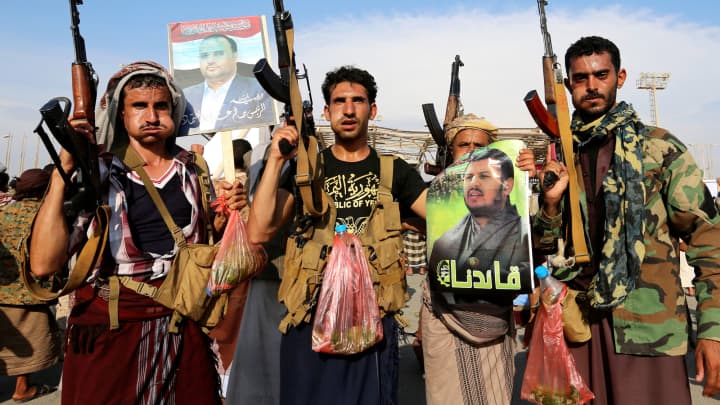
The U.S. State Department on Wednesday designated the Iranian-backed, Yemen-based rebels as specially designated global terrorists, or , in an effort to deter further attacks against commercial ships traversing the .
The SDGT designation triggers an asset freeze aimed at cutting off Houthi financing, but will not take effect until mid-February. The SDGT sanctions specifically do not apply to food, medicine, fuel and other humanitarian assistance going to the Yemeni people.
"If the Houthis cease their attacks, we can consider delisting the designation," a senior administration official said Tuesday on a call with reporters.
It is the next move in the U.S. pressure campaign to weaken the Houthis' Red Sea siege, which the official called "a textbook definition of terrorism."
The State Department under President the Houthis' designation as a foreign terrorist organization, or FTO, in February 2021, just a it issued the label under former President .
The reversal came in response to calls from the and humanitarian groups who said that the terrorist classification and its associated sanctions were "accelerating Yemen's slide into large-scale famine."
Three years later, after months of Red Sea attacks, the Houthis have regained their spot on a U.S. terrorist list.
This time, the U.S. has chosen the SDGT label, as opposed to the stronger FTO designation, in order to better minimize unintended consequences to Yemeni civilians while still deterring the Houthis, the senior administration official said.
"The people of Yemen should not pay the price for the actions of the Houthis."
The latest Houthi terrorist label is "one piece of a broader effort" to stabilize global trade in the Red Sea and prevent regional war in the Middle East, the official added. Since the Houthis began their strikes shortly after the start of the in October, major shipping giants like have paused Red Sea business activity due to safety concerns.
The U.S. has so far used , military pressure and international coordination to combat the Houthis, who have pledged to target any Israel-associated naval entity until the violence in Gaza ends.
On Thursday, the United States and the U.K. carried out against 16 Houthi militant locations, a step that feared would escalate to a wider conflict in the region. The White House rejected that assessment.
"By taking away, degrading some of their capability, [that] certainly makes it harder for them to conduct these strikes," National Security Council spokesman John Kirby said at a press briefing Tuesday.
The U.S. in December also launched , a joint defense force with dozens of countries dedicated specifically to protecting the Red Sea.
Don't miss these stories from CNBC PRO:




